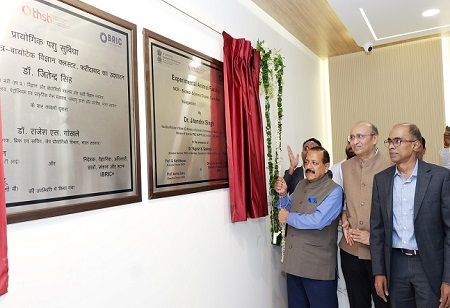Union Minister Dr. Jitendra Singh unveiled Asia’s inaugural 'Pre-clinical Network Facility' for health research today at the Regional Centre of Biotechnology, operated by the Translational Health Science & Technology Institute (THSTI) in Faridabad, in collaboration with the Coalition for Epidemic Preparedness Innovations (CEPI).
The Coalition for Epidemic Preparedness Innovations (CEPI) has designated BRIC-THSTI as a pre-clinical network laboratory due to its expertise in handling BSL3 pathogens. This facility will be the ninth of its kind globally and the first in Asia. Similar laboratories are located in the USA, Europe, and Australia. The Experimental Animal Facility at BRIC-THSTI is among the largest in the country, capable of housing approximately 75,000 mice, including immune-compromised mice, as well as other species like rats, rabbits, hamsters, and guinea pigs.
Dr. Jitendra Singh, Union Minister of State (Independent Charge) for Science and Technology, Earth Sciences, PMO, Department of Atomic Energy, Department of Space, and Personnel, Public Grievances, and Pensions, inaugurated the "Genetically Defined Human Associated Microbial Culture Collection (Ge-HuMic) Facility." This facility will function as a repository, providing microbial cultures to research institutes, universities, and industries for R&D purposes. It serves as a Nodal Resource Center, facilitating national and international collaborations among academic institutions, hospitals, and industry. Additionally, it will store genetically characterized specific pathogen-free animals, including cryopreserved embryos and sperm, for researchers across the country.
The Translational Health Science and Technology Institute (THSTI), part of the Biotechnology Research and Innovation Council (BRIC) under the Department of Biotechnology, Ministry of Science and Technology, has facilitated the signing of over a dozen agreements and MoUs with the private sector. These collaborations focus on vaccine development and research targeting diseases like Nipah Virus, Influenza, and other respiratory illnesses. THSTI aims to support innovative fundamental research and translational studies, including testing drug and vaccine candidates and identifying biomarkers for disease progression and resolution. It promotes interdisciplinary research collaborations between academia and industry.
Addressing the 14th Foundation Day of THSTI, Dr. Jitendra Singh reflected on the institute's journey from its inception. He acknowledged the pioneering efforts of Dr. M.K Bhan in establishing THSTI. The Minister noted, "In just 14 years, the institute has achieved significant milestones. The Covid-19 pandemic underscored its vital role, bringing recognition to its efforts and highlighting its importance." He also emphasized that the Department of Biotechnology is relatively young.
The Minister appreciated DBT’s steady progress despite the dearth of resources. He also assured to press and support the needs of the department regarding office infrastructure etc. The Science and Technology Minister underscored the pivotal role played by the institute in COVID pandemic and vaccine development which were granted emergency use authorization in India. He said “India is recognized as a frontline nation in preventive healthcare”, emphasizing the vaccine development and research in DBT.
Dr. Jitendra Singh, an endocrinologist himself, discussed the current health challenges, focusing on the burden of lifestyle-related metabolic diseases among the Indian population. He also emphasized Prime Minister Modi’s vision of achieving a TB-free India and called for collective efforts towards this goal. Dr. Jitendra Singh highlighted THSTI’s contribution to developing Nipah monoclonal antibodies and noted the adoption of immediate kangaroo mother care as a WHO-recommended practice to reduce infant mortality rates.

